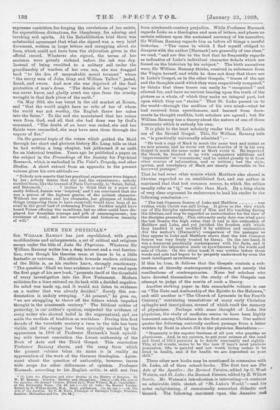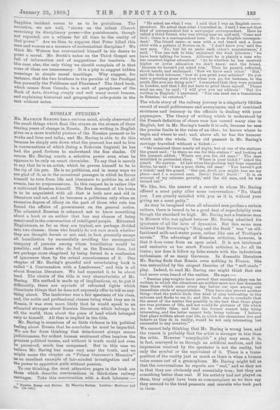LUKE THE PHYSICIAN.* Sin WILLIAM RAMSAY has just republished, with
great modifications and enlargements, a set of critical and religious essays under the title of Luke the Physician. Whatever Sir William Ramsay writes has a deep interest and a real fascina- tion, even though his theories seem at times to be a little fantastic or extreme. His attitude towards modern criticism of the Bible is, as his readers know, strongly reactionary. " The question ' Shall we hear evidence or not ?'" we read upon the first page of his new book, "presents itself at the threshold of every investigation into the New Testament. Modern criticism for a time entered on its task with a decided negative. Its mind was made up, and it would not listen to evidence on a matter that was already decided." Surely this con- demnation is unduly sweeping. " At present," he goes on, " we are struggling to throw off the fetters which impeded thought in the nineteenth century." The Biblical critics of yesterday, in our author's opinion, suspected the evidence of every writer who showed belief in the supernatural, and set aside the verdicts of tradition as worthless. During this first decade of the twentieth century a turn in the tide has been visible, and the change hae been specially marked by the appearance in 1906 of Professor Harnack's book uphold- ing with fervent conviction the Lucan authorship of the Book of Acts and the Third Gospel. This conviction Professor Ramsay shares, and the essay from which the present volume takes its name is in reality an appreciation of the work of the German theologian. Agree- ment about the question of authorship, however, leaves wide scope for other differences of opinion. Professor Harnack, according to his English critic, is still not free * (1) Luke the Phusiolan, and other Studios in Me History of Religion. By W. M. Ramsay. London : fodder and Stoughton. 112sa--(2) The _Acts oj the Apostles: the Revised Version. Edited by C. West Watson, M.A. Cambridge at the University Press. [1s. 6d. net,]—(3) St. Luke the Revised Version. Edited by E, Wilton South, M.A. Same publishers. [Is. Od. net.] —(4) The Acts of the Apostles. By B. M. Knox Principal of Havorgal College, Toronto. London Macmillan and. Co. [Ss. 6d. from nineteenth-century prejudice. While Professor Harnack regards Luke as a theologian and man of letters, and places no certain reliance upon the sustained accuracy of his narrative, Sir William Ramsay regards him as before all things a careful historian. " The cases in which I find myself obliged to disagree with the author [Harnaokj are generally of one class," we read, "and are due to the fact that he frequently regards as indicative of Luke's individual character details which are forced on the historian by his subject." The birth narratives were, Sir William Ramsay thinks, received in substance from the Virgin herself, and while he does not deny that there are in Luke's Gospel, as in the other Gospels, " traces of the age and the thoughts amid which they were respectively composed," he thinks that these traces can easily be " recognised " and allowed for, and have no serious bearing upon the truth of the picture as a whole, of which they make no integral part, but upon which they are " stains." That St. Luke passed on to the world—through the medium of his own mind—what he had received from eyewitnesses, and learned from docu- ments he thought credible, both scholars are agreed ; but Sir William Ramsay has a theory about the nature of one of those documents which is entirely his own.
It is plain to the least scholarly reader that St. Luke made use of the Second Gospel. This, Sir William Ramsay tells us, "is practically universally admitted" :— "He took a copy of Mark in much the same text and extent as wo now possess, and ho wrote out three-fourths of it in his own Gospel in much the same order as Mark wrote it. He improved the Greek, he touched it up with explanatory additions and improvements' or corrections,' and he added greatly to it from other sources of information, oral or written ; but the style, syntax, and vocabulary of Mark are clearly discernible in the borrowed passages."
That he had some other source which Matthew also shared is likewise regarded as an established fact, and our author is convinced that that lost common source, to which the critics usually refer as " Q," was older than Mark. By a long chain of very clear argument he endeavours to lead his reader to the following conclusion :— " The lost Common Source of Luke and Matthew was
written while Christ was still living. It gives us the view which one of His disciples entertained of Him and His teaching during His lifetime, and may be regarded as authoritative for the view of the disciples generally. This extremely early date was what gave the lost Source the high value that it had in the estimation of Matthew and Luke, and yet justified the freedom with which they handled it and modified it by addition and explanation (for the author's [Harnack's] comparison of the passages as they appear in Luke and Matthew shows that the lost Common Source was very freely treated by them). On the one hand, it was a document practically contemporary with the facts, and it registered the impression made on eyewitnesses by the words and acts of Christ. On the other hand, it was written before those words and acts had begun to be properly understood by even the most intelligent eyewitnesses."
If this be true, it follows that the Gospels contain a sub-, stratum of literally contemporary evidence, not merely the recollections of contemporaries. None but scholars who have devoted themselves to the study of the Gospels can attempt to judge of the merits of such a theory.
Another striking paper in this remarkable volume is one on " The Date and Authorship of the Epistle to the Hebrews," and still another is " The Church of Lycaonia in the Fourth Century," containing translations of many early Christian epitaphs and inscriptions, several of which exalt the memory of physicians. Perhaps with some thought of Luke the physician, the study of medicine seems to have been highly honoured among Christians in the first centuries. Our author quotes the following curiously modern passage from a letter written by Basil in about 374 to the physician Eustathius :- " Humanity is the regular business of all you who practise as physicians. And, in my opinion, to put your science at the head and front of life's pursuits is to decide reasonably and rightly. This, at all events, seems to be the case if man's most precious possession, life, is painful and not worth living unless it be lived in health, and if for health we are dependent on your skill."
Three other new books may be mentioned in connexion with St. Luke, all of them school-books. The first two are The Acts of the Apostles the Revised Version, edited by C. West Watson, and St. Luke : the Revised Version, edited by E. Wilton South. Mr. Watson's introduction is interesting—it contains an admirable little sketch of " St. Luke's World "—and his notes enlightening, if occasionally somewhat didactic and biassed. The following comment upon the Ananias and
Sapphira incident seems to us to be gratuitous. The narrative, we are told, " shows us the infant Church exercising its disciplinary power-tlie punishments, though not repeated, are a witness for all time to the reality of that power." Are we then to suppose that Peter killed this Man and woman as a measure of ecclesiastical discipline ? We think Mr. Watson has overreached himself in his desire to point a moral. Mr. South's notes on the Third Gospel are full of information and of suggestions for teachers. In this case, also, the only thing we should complain of is that some of them are unnecessary. It is a pity to suggest hidden meanings in simple moral teachings. Why suggest, for instance, that the two brothers in the parable of the Prodigal Son personify the Publicans and Pharisees P The third book, which comes from Canada, is a sort of paraphrase of the Book of Acts, drawing simply and well many moral lessons, and explaining historical and geographical side-points in the text without notes.







































 Previous page
Previous page